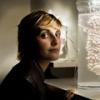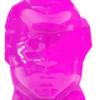Queer Viral Practices in New Media Art and Theory
In this panel, we will focus on queer new media art and philosophy that uses and intervenes into the viral to form a radical politics of revolt and utopia. Viral will be engaged with technically, philosophically, artistically, biologically, and effectively. Our aim is to show that while viral rhetoric and discourses have marginalized and controlled queer populations, the viral remains an allusive, volatile potential that can be experimented with toward creating new queer politics and worlds. Cárdenas and Mehrmand will discuss their current collaboration virus.cirus, an episodic series of performances using wearable electronics and live audio to bridge virtual and physical spaces that explores queer futures of latex sexuality amidst a speculative world of virus hysteria and DIY medicine. Blas will speak on new works from his ongoing Queer Technologies project that attempt to formulate a viral aesthetics based on a replicating difference of never-being-the-sameness against capital’s own modulating structure.
Presenters

Micha Cárdenas is an artist/theorist who works in performance, wearable electronics, hacktivism and critical gender studies. She is a PhD student in Media Arts and Practice (iMAP) at University of Southern California and a member of Electronic Disturbance Theater 2.0. Her book The Transreal: Political Aesthetics of Crossing Realities was published by Atropos Press in 2012. She blogs at transreal.org and tweets at @michacardenas.
Micha’s recent publications include Trans Desire/Affective Cyborgs, with Barbara Fornssler, from Atropos Press, “I am Transreal”, in Gender Outlaws: The Next Generation from Seal Press and “Becoming Dragon: A Transversal Technology Study” in Code Drift from CTheory. She was previously the Interim Associate Director of Art and Technology for UCSD’s Sixth College in the Culture, Art and Technology program. She has been an artist/researcher with the b.a.n.g. lab at Calit2, the UCSD School of Medicine and CRCA as well as a lecturer in the Visual Arts department and Critical Gender Studies program at UCSD. Her collaboration with Electronic Disturbance Theater, the Transborder Immigrant Tool, was the subject of widespread media coverage. She has exhibited and performed in biennials, museums and galleries in places around the world including Los Angeles, San Diego, Tijuana, New York, San Francisco, Montreal, Colombia, Egypt, Ecuador, Spain, Switzerland and Ireland. Her work has been written about in publications including Art21, the Associated Press, the LA Times, CNN, BBC World, Wired and Rolling Stone Italy.

Pinar Yoldas is a cross-disciplinary artist, all-in-one designer and a neuro-enthusiast.
Through her work she investigates social and cultural systems in regards to biological and ecological systems. Lately she has been designing mutations, tumors and neoplasmic organs to rethink the body and its sexuality transformed by the mostly urban habitats of techno-capitalist consumerism. Her current project Speculative Biologies simulates the experience of a " natural history museum of the future" showcasing Species of Excess elegantly caged in incubators, jars, aquariums.
Pinar's work has been exhibited internationally including Bologna(Italy) , Torun(Poland), Istanbul, Frankfurt, Providence, Portland, Berkeley, New Mexico and Los Angeles. She has been awarded residency fellowship grants at MacDowell Colony, UCross Foundation and VCCA. Her artwork has been featured in Wired Magazine(online), Digicult(online) and Beatiful Decay.
Her research interests include evolutionary aesthetics, art-neuroscience interactions and subversive gaming environments . She is an active lab member of s-1: Speculative Sensation Lab, led by Mark B. N. Hansen (Duke University) and UCLA ArtSci Center + Lab led by Victoria Vesna (UCLA).
She has held teaching positions in Istanbul KH University , UCLA and Duke University and has led workshops in physical computing, programming and interface design. Pinar has a BArch from METU , MS from ITU , MA from Istanbul Bilgi University and an MFA from UCLA.Currently she is a PhD student in the Art, Art History and Visual Studies department at Duke University.
Check her latest project Speculative Biologies and more at http://pinaryoldas.info .

Zach Blas is an artist and theorist working at the intersections of networked media, queerness, and the political. His work engages emerging media technologies with a multitude of aesthetic and resistant tactics to challenge neoliberal control structures and generate new potentials for queer politics, affect, and collectivity. He is a PhD student in The Graduate Program in Literature, Information Science + Information Studies, Visual Studies, Women’s Studies, as well as a lab member of s-1: Speculative Sensation Lab, led by Mark B. N. Hansen, at Duke University. He is also a founding members of The Public School Durham, and a contributing editor for the online journal Version. His on-going project, Queer Technologies, is an organization that produces critical applications, tools, and situations for queer technological agency, interventions, and social formation. By re-imaging a technology designed for queer use, Queer Technologies critiques the heteronormative, capitalist, militarized underpinnings of technological architectures, design, and functionality. Queer Technologies includes, transCoder, a queer programming anti-language; ENgenderingGenderChangers, a “solution” to Gender Adapters’ male/female binary; and Gay Bombs, a technical manual manifesto that outlines a “how to” of queer networked activism. QT items are often displayed and deployed at the Disingenuous Bar, an attack on Appleʼs Genius Bar that offers a heterotopic space for political support for “technical” problems. Zach’s on-going practice-based research spans five areas: 1) unhuman modes of resistance that address the human and nonhuman together, 2) a set of political works on abandonment, escape, nonexistence, desertion, and imperceptibility that re-conceptualize resistance, 3) affect, specifically engaging with political love, and affect as weapon and incalculable, 4) the virus and viral as a form of aesthetics, politics, and philosophy, and 5) networked hacktivist practices of hypertrophy, invagination, electronic civil disobedience, and disturbance. Drawing from these areas, Zach is configuring a conception of THE WEAPON as a practiced-based research methodology, pulling from weaponry’s long history of reconceptualization on the Left and various forms of aesthetic resistance. This involves configuring queerness as a militant weapon. Zach holds a Master of Fine Art, Design | Media Arts, University of California Los Angeles; a Post-Baccalaureate Certificate, Art and Technologies Studies, The School of the Art Institute of Chicago; and a Bachelor of Science, Film and Philosophy, Boston University. Zach also conducted a year of PhD research at the University of California Berkeley in the Film & Media track of the Rhetoric Department with a joint appointment in the Center for New Media.


